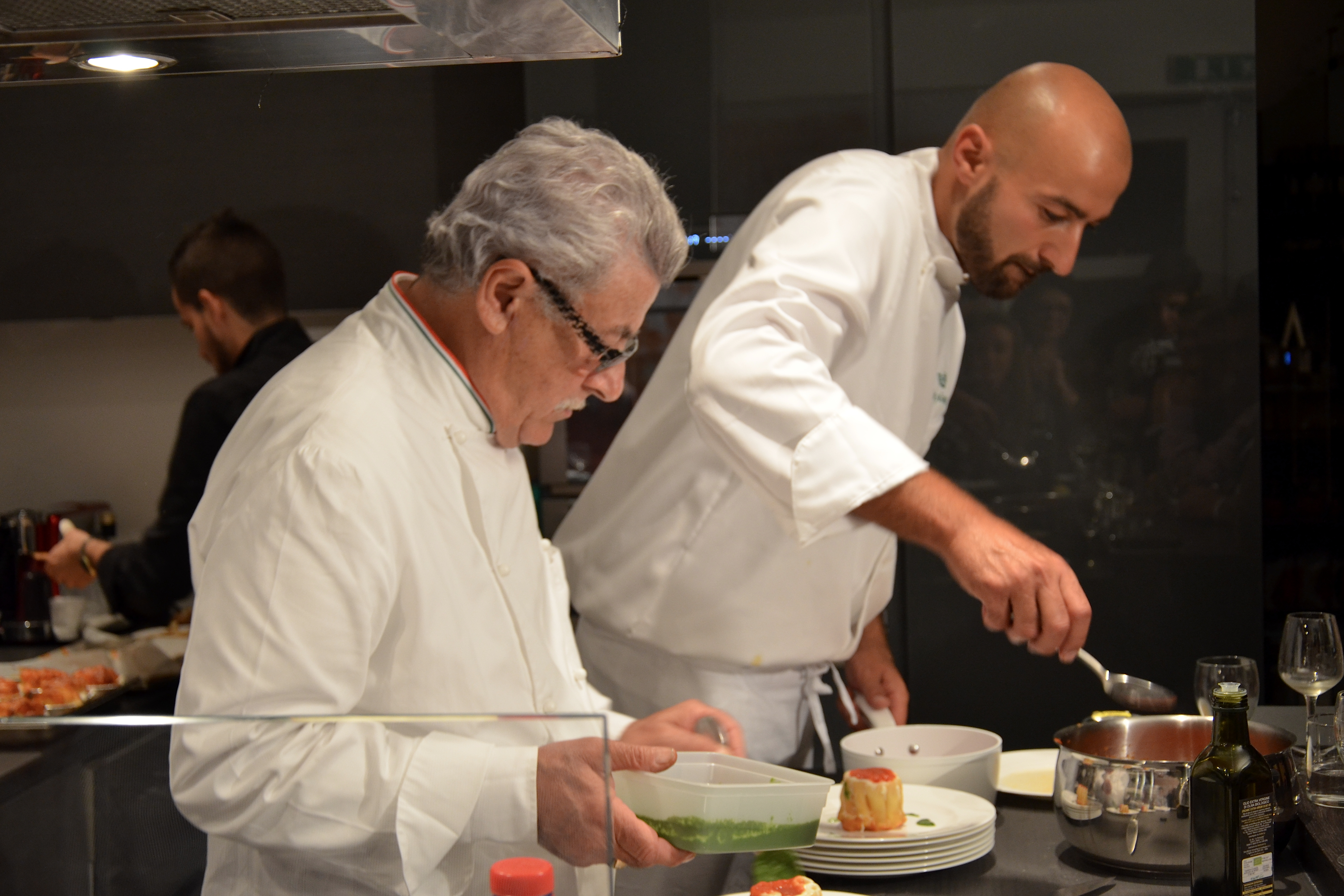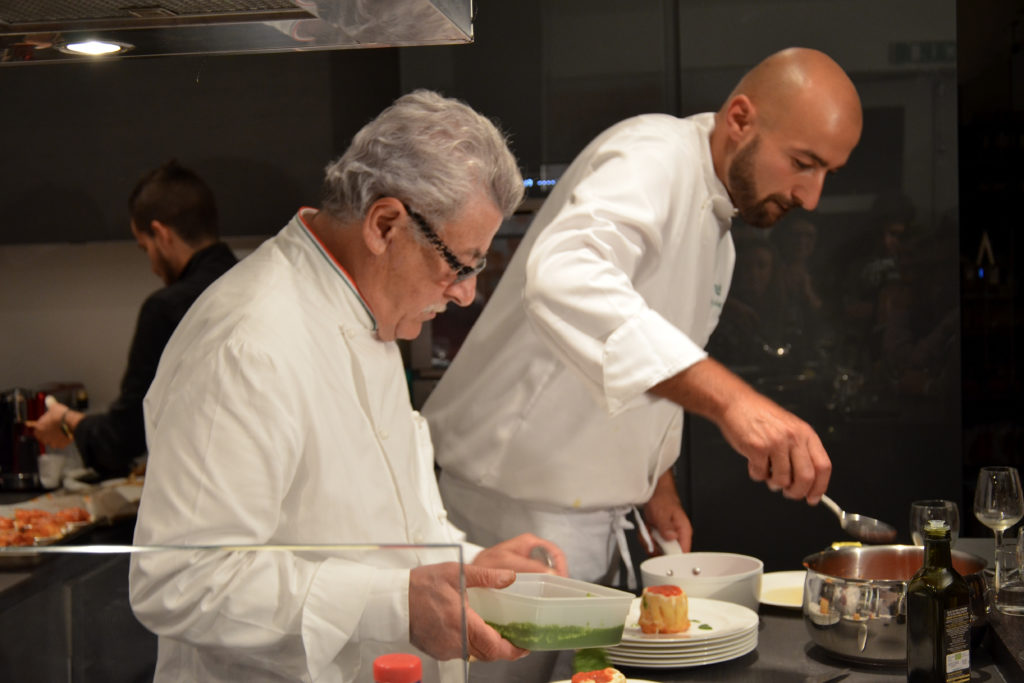Sociedade
Don Alfonso vindicates Proust
Italian cuisine makes a splash in France


In Paris
Italian Institute of Culture, Hôtel de Galliffet, a charming retreat in Paris, October 10th: “Gastronomy should be light and elegant, explains Alfonso Iaccarino. Nobody is more qualified than the chef Alfonso and his wife Livia, icons of Italian cuisine, to satisfy, in a seminar titled L’Italiano in Cucina (“The Italian in the kitchen”), the taste buds of gastronomic critics, or simply of those adventurers in search of flavor and aromas, as is the case of this reporter. In fact, the “light” and “elegant” cuisine of Iaccarino is but an aphorism.
As Proust said, apropos of the similarity between the painter and the chef, they both frame nature: The dishes described below are true paintings, and the titles do them justice. Alfonso’s dishes are of tremendous Proustian sophistication. Consider the evening menu at the Hôtel de Galliffet, which I had expected to be a simple seminar where we would nibble something unusual followed by a few sips of wine. This was not the case.
Here’s the menu:
First dish: Tuna foam with gelatin of lemons.
Second: Vesuvius of Rigatoni dedicated to Maria Orsini Natale.
Third: Sour golden fried codfish served whole, on the bone, bittersweet of lemons and sour buffalo yogurt.
Dessert: Impressionism of zabaione cream with coffee.
All this, of course, is accompanied by wines. A Ca’del Bosco, with tuna deliciously melting in the mouth, produced an exalting effect. The Cabernet Sauvignon was made for the Vesuvius of Rigatoni it accompanied. Alfonso enlightens me: “It’s a cheap wine, but isn’t it good?”A French critic observes: “I never imagined that an Italian Cabernet Sauvignon could be so good.”
At the beginning of the seminar, Livia Iaccarino spoke. She announced the menu without leaving aside interesting personal details. “I do not cook, I taste. And I love.” She continued: “I explain the menu because Don Alfonso is in the kitchen.” But in addition to managing he family company that operates worldwide—Rome, Marrakesh, Dubai and Macau—, Livia is a true historian of her Southern region through the research of products used in the kitchen of their main restaurant, the safe harbor, Don Alfonso 1890, in Sant’Agata, a picturesque village on the Sorrento Peninsula.
Over 20 years ago, the Iaccarino couple bought a farm called “Le Peracciole,” overlooking the Isle of Capri, from where all greens and vegetables go to the kitchen of Don Alfonso 1890, as well as rabbits and chickens. In the case of the vegetables, everything is organic. Fundamental to the success of Don Alfonso 1890 is the participation of both of the Iaccarinos’ children, Mario, the manager, and Ernesto, a chef like his father. Ernesto also teaches cooking courses.
The seminar of the Iaccarinos had a great impact in Paris, where, as Marina Valensise, director of the Italian Institute, sums up, “in France, Italian cuisine does not exist.” Perfectly bilingual (Italian and French), Valensise adds: “Here, imagine, they are capable of serving fettuccine with salmon.”In fact, it is a heresy. According to Valensise, this gastronomic seminar is a “promotion of civilization.”
Hope remains that someday we will have real Italian restaurants in France. It would be a victory for lovers of Italian food. If in Great Britain there are many quality Italian restaurants, in France they are lacking.

France, of course, has its sophisticated gastronomy recognized by the awarding of Michelin stars. The renowned red-cover guide also ventures abroad. Their secret critics (nobody knows who they are) distribute or withhold stars in successive visits to the same restaurant, but always, it appears, based on French criteria—namely, gastronomy, décor and service—although the weighting of the respective factors is unclear.
It also is unclear whether restaurants from other countries receive Michelin stars because they are influenced by French cuisine. Outside of France, Michelin stars are not taken seriously by many critics and restaurant clients.
However, there are exceptions: Don Alfonso1890 has two Michelin stars. It had three, but one was withdrawn at the same time as the Iaccarinos refused to use Nestlé products, a brand allegedly responsible for the excellence of chefs specializing in foams.
The family tradition goes back to the late 1800s, when Alfonso’s grandfather, Alfonso Costanzo Iaccarino, opened it with a German named Brandmeier, in1890. A little less than a century later, Alfonso and his wife Livia decided to take the business further and added the restaurant.
At the Italian Institute, the charismatic Alfonso exudes energy. Aged 77, he is backed by two other chefs from Don Alfonso restaurants around the world. Sitting around a huge silver counter in the ultramodern kitchen of the lush eighteenth century palace, we hear a smiling Alfonso explain: “The best dishes are the simplest.”
But it is not really like that. To make a simple dish can be very difficult.
Consider making the perfect Neapolitan spaghetti with its sauce made up of tomatoes, basil and a spoonful of oregano. Do it well and it will be admissible at Don Alfonso 1890. This, by the way, is the best dish on earth, according to this writer and the President of Italy, Giorgio Napolitano. The making of Neapolitan spaghetti demands a refined technique for cooking the pasta and preparing the sauce. Ideally, the tomato and basil should be Italian.
Apoie o jornalismo que chama as coisas pelo nome
Depois de anos bicudos, voltamos a um Brasil minimamente normal. Este novo normal, contudo, segue repleto de incertezas. A ameaça bolsonarista persiste e os apetites do mercado e do Congresso continuam a pressionar o governo. Lá fora, o avanço global da extrema-direita e a brutalidade em Gaza e na Ucrânia arriscam implodir os frágeis alicerces da governança mundial.
CartaCapital não tem o apoio de bancos e fundações. Sobrevive, unicamente, da venda de anúncios e projetos e das contribuições de seus leitores. E seu apoio, leitor, é cada vez mais fundamental.
Não deixe a Carta parar. Se você valoriza o bom jornalismo, nos ajude a seguir lutando. Assine a edição semanal da revista ou contribua com o quanto puder.






